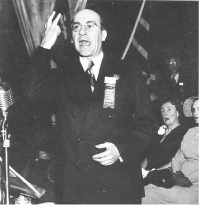Revolutions, quiet or otherwise, rarely go according to plan. Georges Emile Lapalme might have been premier instead of Jean Lesage, had events not conspired against him “Lapalme was the main brain behind everything,” agrees Paul Gerin Lajoe, “There were others who contributed, but he was the chief engineer behind the 1960 election victory.”
 Lapalme had been the federal Member of Parliament for Joliette before he quit Ottawa in 1950 to lead the political fight in Quebec against the authoritarian regime of Premier Maurice le Noblet Duplessis. The times seemed ripe for change. Lapalme was a Quebec nationalist who arrived on the heels of Rufus Global, a radical declaration of cultural independence that had been signed by 16 artists in 1948. That was followed by the landmark Asbestos Strike, Frere Untel’s scathing criticism of Quebec’s incompetent system of education, and Frank Roncarelli’s fight for the expression of religious freedom in Quebec. Lapalme took advantage of the shifting political sands and created a Liberal party platform that combined a new spirit of Quebec nationalism with social justice. His manifesto, Pour un Politique, was a blueprint for the Quiet Revolution that influenced governments for the next 25 years, including Rene Levesque’s Parti Quebecois. “The idea of economic and social reform germinated in Lapalme’s era,” Gerin-Lajoie agrees, “We reaped the benefits of his work when we were elected.”
Lapalme had been the federal Member of Parliament for Joliette before he quit Ottawa in 1950 to lead the political fight in Quebec against the authoritarian regime of Premier Maurice le Noblet Duplessis. The times seemed ripe for change. Lapalme was a Quebec nationalist who arrived on the heels of Rufus Global, a radical declaration of cultural independence that had been signed by 16 artists in 1948. That was followed by the landmark Asbestos Strike, Frere Untel’s scathing criticism of Quebec’s incompetent system of education, and Frank Roncarelli’s fight for the expression of religious freedom in Quebec. Lapalme took advantage of the shifting political sands and created a Liberal party platform that combined a new spirit of Quebec nationalism with social justice. His manifesto, Pour un Politique, was a blueprint for the Quiet Revolution that influenced governments for the next 25 years, including Rene Levesque’s Parti Quebecois. “The idea of economic and social reform germinated in Lapalme’s era,” Gerin-Lajoie agrees, “We reaped the benefits of his work when we were elected.”
Lapalme lost two general elections, in 1952 and again in 1956. By the time Duplessis died in 1958, the party wasn’t prepared to allow Lapalme a third chance. It wanted a winner to take on Duplessis’ hand-picked successor, the suave and exceedingly competent Paul Sauvé. The Liberals chose Jean Lesage. But Sauve died four months after taking office, and he was succeeded by the aging Antonio Barrette. On June 22, 1960 Lesage put an end to 16 years of Le grand noiceur in Quebec, by defeating Barrette, taking 51 per cent of the popular vote and 51 seats in the Quebec Legislature. Significantly, Barrette retained 46 per cent of the popular vote and retained a 43 seat opposition.
Lapalme was rewarded for his efforts by being named Minister of Culture and deputy premier in the Lesage government. After quitting politics, he became the first head of the Canadian Film Development Corporation. He died in 1985.

























Commentaires
Veuillez vous connecter pour poster des commentaires.